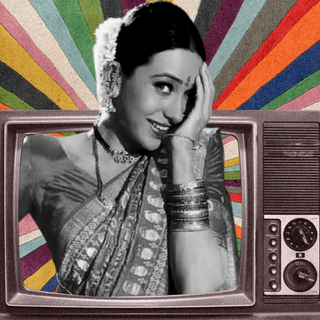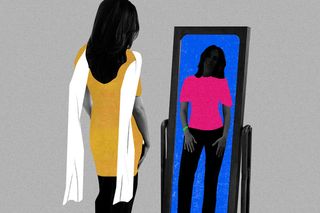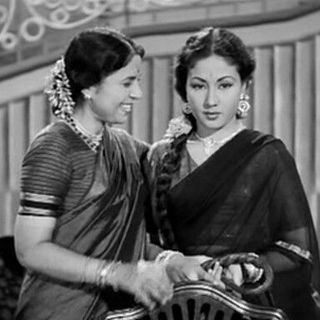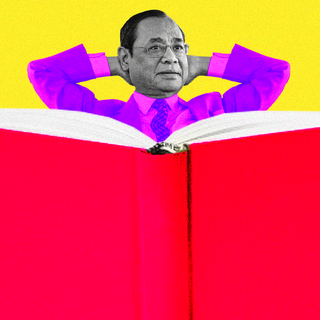
Indian Adults Are Leading ‘Double Lives’ to Avoid Controlling Parents. But What’s the Hidden Cost?
After some “major fights and panic attacks… I realized that honesty is not the best policy with my controlling and traditional mother.”

If you happened to watch 14 Phere this summer and could relate to the reality embedded in the ridiculousness of the plot, you’re hardly alone. The movie explores the tussle in the mind of Vikrant Massey’s character, Sanjay, who has to pretend his girlfriend belongs to the same caste as him and even hire fake in-laws to keep up appearances. At the root of Sanjay’s absurd choices lies the very real fear of confrontation with one’s family — which could possibly lead to harassment, and not impossibly, honor killing. But since this movie was a comedy of errors, unlike Sairat (2016), a Marathi romantic tragedy film, no one died. But Sanjay’s fears hit too close to home for me — instead of inducing laughter like it was meant to, it sent shivers down my spine.
There are many, many Sanjays living in India — hiding their lifestyles, their sexualities, their partners, their careers, and much more from their families.
“I had to lead a double life to be with the man I loved,” says Shamima, who lied to her family for seven years in fear of them disowning her for being in a relationship with a white, non-Muslim man. Her fears weren’t unjustified in the least. After they got secretly engaged and she told her parents she intended to marry him, her parents took her to priests to get her “cleansed” and forbade her from meeting her fiancé. The couple finally relented when she developed depression, but only on the condition that he converts to her religion.
If you Google “Indians leading double lives,” you will be inundated with stories of Indian adults across different socio-economic backgrounds being forced to hide their true preferences and experiences from their families.
“[There is] a constant feeling of choosing between two distinct versions of myself, with each decision feeling like a betrayal,” Harsha Nahata wrote in HuffPost.
Dhvani, 29, says her family has no idea she is sexually active, consumes alcohol, is in therapy for anxiety, and is a feminist. Until twelfth grade, she describes herself as an “obedient nerd,” who “didn’t have many friends” and rarely “went out.” But once she moved away from home to study in Pune, “I realized I could live better without [the] constant control of my mother,” she says.
Related on The Swaddle:
Many Indian Families Express Care Through ‘Bullying,’ Creating Patterns of Abuse
Initially, whenever she went back home during vacations, she refused to “give in to [my mother’s] whims and wishes.” That didn’t go well. “This led to quite a few major fights and panic attacks… That’s when I realized that honesty is not the best policy with my controlling and traditional mother. So I started living the way I wanted [outside of home], and at home, maintained that image she wanted… At home, I became a person I didn’t recognize,” she says. Essentially, she realized that leading a double life was the price she would have to pay for the freedom to live the life she wants without having to deal with the emotional distress her mother caused her — for simply choosing to be herself.
Switching between the two identities often becomes so natural among people leading double lives to avoid being harassed by their families, it starts to seem like a reflex action. “I often tell my friends that they wouldn’t recognize me if they met me when I’m with my parents — it’s like this whole other human being that lives inside my brain just takes over. It’s not even like I’m trying to be different around them — it’s an almost automatic response; the part of my brain that’s dedicated to self-preservation just takes over,” a Reddit user wrote in 2015.
Anjana has hidden her bisexuality, her decision to be childfree, as well as her love for music and dancing, from her family. She says her family “would make sure I knew it angered them” whenever she exercised her individual choice.
“I would rather keep [parts of my life] hidden, than vocalize it and have to deal with their backlash… Constant comparisons to their idealized version of me, and the shame of not being able to be that person — just makes it difficult to live.”
However, hiding parts of oneself and one’s core identity can lead to a litany of mental health issues. Over time, living a lie can take the form of cognitive dissonance. “As we seek acceptance [from our families, from society] by trying to meet their standards, we tend to move away from our true selves… This makes us reject our true selves, and develops a kind of duality within us,” explains Dr. Vidhya Nair, a counseling psychologist.
Dr. Nair goes on to explain how leading a double life “creates a constant conflict within one’s mind… This, in addition to the suppression of oneself, can often lead to identity crisis and depression in many.”
But Dhvani sees no way out. “After a certain point, it becomes tiring,” she says. “In the switch from one to another, you tend to forget who you actually are… There are times the fatigue is so physical that I give up, cancel everything that I have to do and just lay in bed.”
Related on The Swaddle:
How Making Fun of Cultural Stereotypes Keeps People From Bonding With Their Communities
For many, decisions to lead double lives — and feign compliance — are primarily a trauma response. “If I had been caught doing anything that they didn’t think I should be doing — be it hanging out with boys, going out alone — I would have been beaten up and locked until I learned my lesson,” says S., 21.
Interestingly, the excessive control S.’s family wanted to exert on her actually pushed her to go against them more — even if doing so was detrimental to her. “Growing up, I got into really bad company because I wanted to rebel as much as they wanted to control me. Even though it led me to harm several times, I couldn’t stop,” she says.
Moreover, suppressing our true selves around our families also drives home the idea that our true self isn’t “acceptable,” or “good enough,” Dr. Nair explains; adding that it “plants a big seed of self-doubt regarding our authentic selves… reinforcing the fear of rejection in all of us.” This fear, in turn, can lead people to develop “various types of anxiety disorders on a wide spectrum,” she says. As one can imagine, living one’s life as if one were constantly “on the run” can be extremely stress-inducing.
Further, lying to our parents — when movies like Baghban (2003) and Kabhi Khushi Kabhie Gham (2001) have conditioned us to worship them — leads to a sense of guilt seeping in. And living with guilt, experts note, can majorly affect one’s self-esteem. What compounds this guilt further are remarks like “If you don’t tell your parents, how can you know they won’t accept you?”; “Wow, don’t you feel guilty after lying to your parents every day?”; and “They brought you up. Of course, they’ll understand.” These statements often come from peers who grew up with open-minded parents, were allowed to develop their own personalities, and be unabashedly themselves.
“They would never understand why I would hide what I needed to hide,” Anjana says.
Perhaps, the only way out of this vicious cycle will emerge when Indian parents stop perceiving their children as an extension of their own values and ideals — and as free individuals instead.
“[There are times when you] wonder if this is worth it. It would be so easy to give in… and get their approval, be at peace. But peace doesn’t give happiness,” Dhvani says.
Devrupa Rakshit is an Associate Editor at The Swaddle. She is a lawyer by education, a poet by accident, a painter by shaukh, and autistic by birth. You can find her on Instagram @devruparakshit.
Related


Woe Is Me! “My Mother Forced Me to Make a Profile on a Marriage Site. Will I Ever Be Able to Forgive Her?”
